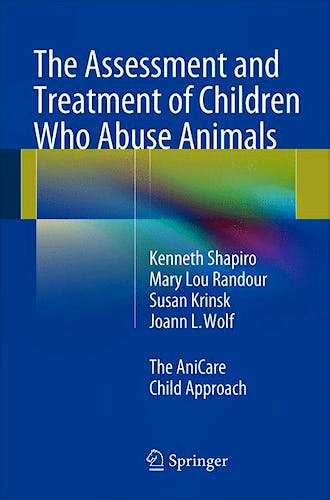

No hay productos en el carrito



The Assessment and Treatment of Children Who Abuse Animals. The Anicare Child Approach
Shapiro, K. — Randour, M. — Krinsk, S. — Wolf, J.
1ª Edición Septiembre 2013
Inglés
Tapa blanda
124 pags
219 gr
16 x 23 x 1 cm
ISBN 9783319010885
Editorial SPRINGER
LIBRO IMPRESO
-5%
67,59 €64,21 €IVA incluido
64,99 €61,74 €IVA no incluido
Recíbelo en un plazo de
2 - 3 semanas
ABOUT THIS BOOK
· Step-by-step guidance on how to assess and treat children who commit
animal abuse
· Takes into consideration cognitive behavioral, psychodynamic, and attachment
theories
· Accompanying electronic supplementary material demonstrating role-played
assessment and treatment
· Ideal guide for therapists in social work, psychology, psychiatry,
and allied fields?
Empirical research has clearly demonstrated that animal abuse in childhood is associated with family violence and violent behavior towards humans in general. Such abuse is accordingly of increasing interest within human services and the criminal justice system.
This handbook will serve as an ideal resource for therapists in social work, psychology, psychiatry, and allied fields who work with children who have abused animals. It provides step-by-step guidance on how to assess, develop appropriate treatment plans for, and treat children who commit animal abuse, based on the AniCare model developed by the Animals and Society Institute. Exercises cover the identification and expression of feelings, the development of empathy, self-management skills, and working with parents. Careful consideration is also paid to the effects of witnessing animal abuse. The theoretical framework is eclectic, encompassing cognitive behavioral, psychodynamic, and attachment theories. A number of illustrative case studies are included, along with excerpts from treatment sessions. Accompanying electronic supplementary material demonstrates role-played assessment and treatment and includes workshop presentations of pedagogic material.
Content Level » Professional/practitioner
Keywords » Animal Abuse - Attachment Theory - Cognitve Behaviorism - Psychiatric
Disorders -Puppet Role-Play
Related subjects » Child & School Psychology - Medicine – Psychology
TABLE OF CONTENTS
Context: Animal Abuse and Family Violence.- The Prevalence of Juvenile Animal Abuse.- Changing Attitudes Toward Animal Abuse. Theory: Attachment Theory.- Cognitive Behaviorism and Trauma-informed Narrative.- Psychodynamic Theory.- Assessment.- Diagnostic Categories Associated with Children Who Commit Animal Abuse.- Attention-Deficit and Disruptive Behavior Disorders.- Attachment Difficulties. Treatment.- Processing Therapist Reactions.- Joining the Client.- Framing the Therapy.- Animal-assisted Therapy.- Empathy.- Clinical Cases.- Empathy Development: Psychosocial Emotional Exercises.- Puppet Role-play.- Self-Management.- Working with Parents Behavior-Based Parent Training Tools.- Behavioral Techniques Used for.- Treating Aggressive Youth.- Relationships and Family Processes.- Building the Therapeutic Alliance.
© 2025 Axón Librería S.L.
2.149.0